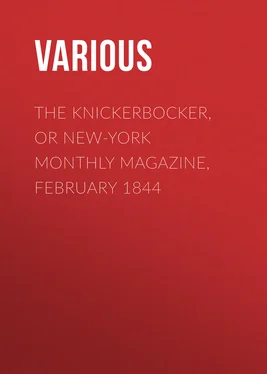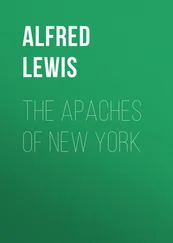Various - The Knickerbocker, or New-York Monthly Magazine, February 1844
Здесь есть возможность читать онлайн «Various - The Knickerbocker, or New-York Monthly Magazine, February 1844» — ознакомительный отрывок электронной книги совершенно бесплатно, а после прочтения отрывка купить полную версию. В некоторых случаях можно слушать аудио, скачать через торрент в формате fb2 и присутствует краткое содержание. Жанр: foreign_antique, periodic, foreign_edu, на английском языке. Описание произведения, (предисловие) а так же отзывы посетителей доступны на портале библиотеки ЛибКат.
- Название:The Knickerbocker, or New-York Monthly Magazine, February 1844
- Автор:
- Жанр:
- Год:неизвестен
- ISBN:нет данных
- Рейтинг книги:3 / 5. Голосов: 1
-
Избранное:Добавить в избранное
- Отзывы:
-
Ваша оценка:
- 60
- 1
- 2
- 3
- 4
- 5
The Knickerbocker, or New-York Monthly Magazine, February 1844: краткое содержание, описание и аннотация
Предлагаем к чтению аннотацию, описание, краткое содержание или предисловие (зависит от того, что написал сам автор книги «The Knickerbocker, or New-York Monthly Magazine, February 1844»). Если вы не нашли необходимую информацию о книге — напишите в комментариях, мы постараемся отыскать её.
The Knickerbocker, or New-York Monthly Magazine, February 1844 — читать онлайн ознакомительный отрывок
Ниже представлен текст книги, разбитый по страницам. Система сохранения места последней прочитанной страницы, позволяет с удобством читать онлайн бесплатно книгу «The Knickerbocker, or New-York Monthly Magazine, February 1844», без необходимости каждый раз заново искать на чём Вы остановились. Поставьте закладку, и сможете в любой момент перейти на страницу, на которой закончили чтение.
Интервал:
Закладка:
The question now was, what were we to do? Some proposed that we should move our camp across the branch and pitch our tent among our Indian allies; for it was argued with much force that if our spies had been discovered, the Sioux would follow their trail, and as it passed directly by our tents, we should fall the first victims; that if the Sioux, notwithstanding their superiority in numbers, should not think it prudent to attack the main camp, they would not fail to attack, according to their custom, the out-camps, take what scalps they could, and retreat. But there was a strong objection to moving our camp: the Indians frequently during the march had desired us to pitch our tents among them, but we had always declined, preferring to be by ourselves. What would they say if we should now break up our encampment and go among them? ‘White men are cowards! They rejected our request when all was safe, but now at the approach of danger they come skulking among us like dogs for protection.’ No; we could not do this; pride forbade it. We next discussed the expediency of dividing ourselves into a watch, and keeping guard by turns through the night. The more experienced of the party, and particularly Jamison, an old hunter and Indian fighter, said that this would only exhaust us, and would be of no avail; that our Indian allies had spies around the encampment in every direction; that if they failed to perceive the approach of the enemy, we could not discover them; that the first intimation our sentinels would have would be an arrow through the body; that our best plan would be to extinguish our fires, prepare our arms, lie down with them in our hands, rely on the Indian spies for notice of the enemy’s approach, and on the first alarm make our way to the Indian camp, being careful as we approached it to give the pass-word for the night, ‘ Wal-las-ki-push-eto .’ We all finally came to this conclusion.
During the discussion, two of the party had not spoken a word; one was our tent-mate ‘Doings,’ who was so completely paralyzed with fright as to be unable to think or speak; the other was old ‘Leatherstocking,’ who listened with the utmost coolness to all that was said, occasionally expressing assent or dissent by a nod or shake of the head. I now observed him quietly examine his rifle, draw the charge and reload; take out the flint and replace it with a new one; he then threw himself down for the night, his bared knife in his left hand, and his right resting on the breech of his rifle, remarking as he composed himself to sleep, ‘We must be ready boys; there’s no telling when the varmints will be upon us.’
B– and myself prepared our arms: each of us wore a brace of pistols in a belt; these were carefully loaded and buckled on; our rifles were next examined and put in order; our hatchets were placed at hand, and with many misgivings we laid ourselves down. It was some time before I could sleep, and when I did, my repose was disturbed by dreams. How long I slept I am unable to say, perhaps not more than an hour, when I was suddenly awakened. I listened. The noise of the horses, of which there were several hundred grazing in the valley, with the tinkling of the bells on their necks, were the only sounds that at first met my ear; all else was silent. Presently I heard a noise as if made by the stealthy tread of a man; then a voice, or perhaps the cry of some animal. It was repeated. I heard it in the grove, on the hill, then an answering cry on the other side of the stream. I knew that Indians in a night-attack make signals by imitating the cry of some animal; and the sounds I heard, though like those made by wild beasts, seemed to me to be in reality human voices. I drew a pistol from my belt, cocked it, and with a hatchet in my other hand, crept out of the tent, and lying on the ground, looked cautiously around. The cries continued at intervals, and I became more and more satisfied that they were human voices. I felt, I knew that the Sioux were about to attack us. A thousand thoughts flashed across my mind. I thought of the home of my childhood, my far distant kindred; a mother, sisters, brothers. Unskilled as I was in Indian warfare, I expected to be slain. I was alarmed; frightened perhaps, but not paralyzed. I resolved to fight to the last, and if I must die, to fill no coward’s grave.
As my eyes became more accustomed to the darkness, I began to distinguish objects; and peering beyond our line of tents, I saw on our right, between me and the grove, three dark objects like human heads projecting out of the grass. While I was observing them, two of them disappeared, and I could discern the grass wave as they made their way toward our encampment. There was no longer room for doubt. I called to B– in a whisper; he was on his feet and by my side in an instant, a cocked pistol in each hand. I directed his attention to what I saw. He looked steadfastly for a moment, then raising his eyes to the grove, exclaimed in a whisper, ‘The timber is full of Indians! I see them advancing from tree to tree; it is time for action. I shall fall, but you may be saved; if so, let my friends in Kentucky know that I died like a brave man. I will arouse the rest.’
He went to the tent on our left, while I remained watching the approach of the enemy. I could see them distinctly as they moved from tree to tree. I heard B– call in a whisper, ‘Jamison! Jamison!’ Jamison came out of his tent but without his arms. B– told him of our danger, and directed his attention to the Indians in the grove. As he spoke Jamison stretched out his arms and gave a yawn, remarking, ‘These Injuns are mighty unsartin critters; there’s no knowing about their motions;’ crawled into his tent again. B– returned; neither of us spoke. We lay down and drew our blankets over us; at length B– said:
‘Harry?’
‘What?’
‘Hoaxed! by thunder!’
The whole truth, which had been breaking in upon my mind by degrees, now flashed upon me, and I raised a shout of laughter. At this instant, poor ‘Doings,’ who had been awake from the commencement, but who was so scared that he had rolled himself under the eaves of the tent, and contracted himself into a space scarcely larger than my arm, and who in his terror would have lain still and had his throat cut without wagging a finger in defence; this poor, miserable ‘Doings’ exclaimed ‘Haw! haw! haw! I knew it all the time; I never see fellows so scared!’ This was too bad. However, we had our laugh out, discussed plans for vengeance, went to sleep and had quiet slumbers for the rest of the night.
The next morning we ascertained that the whole story about the Sioux encampment had been fabricated for the purpose of trying our mettle, and that all save B–, myself and ‘Doings,’ were in the secret. The moving objects which I had seen in the grass were Indian dogs prowling around for food, and the Indians in the timber existed only in our excited imaginations.
I may hereafter give an account of the modus operandi of our revenge, and of our mode of hunting the buffalo, in which we met with much success; and of other matters of interest which fell under my observation during the sixty days we spent with this tribe of Indians.
H. T. H.LIFE’S YOUNG DREAM
‘There is no Voice in Nature which says ‘Return.’’
Those envious threads, what do they here,
Amid thy flowing hair?
It should be many a summer’s day
Ere they were planted there:
Yet many a day ere thou and Care
Had known each other’s form,
Or thou hadst bent thy youthful head
To Sorrow’s whelming storm.
Oh! was it grief that blanched the locks
Thus early on thy brow?
And does the memory cloud thy heart,
And dim thy spirit now?
Or are the words upon thy lip
An echo from thy heart;
And is that gay as are the smiles
With which thy full lips part?
Интервал:
Закладка:
Похожие книги на «The Knickerbocker, or New-York Monthly Magazine, February 1844»
Представляем Вашему вниманию похожие книги на «The Knickerbocker, or New-York Monthly Magazine, February 1844» списком для выбора. Мы отобрали схожую по названию и смыслу литературу в надежде предоставить читателям больше вариантов отыскать новые, интересные, ещё непрочитанные произведения.
Обсуждение, отзывы о книге «The Knickerbocker, or New-York Monthly Magazine, February 1844» и просто собственные мнения читателей. Оставьте ваши комментарии, напишите, что Вы думаете о произведении, его смысле или главных героях. Укажите что конкретно понравилось, а что нет, и почему Вы так считаете.












